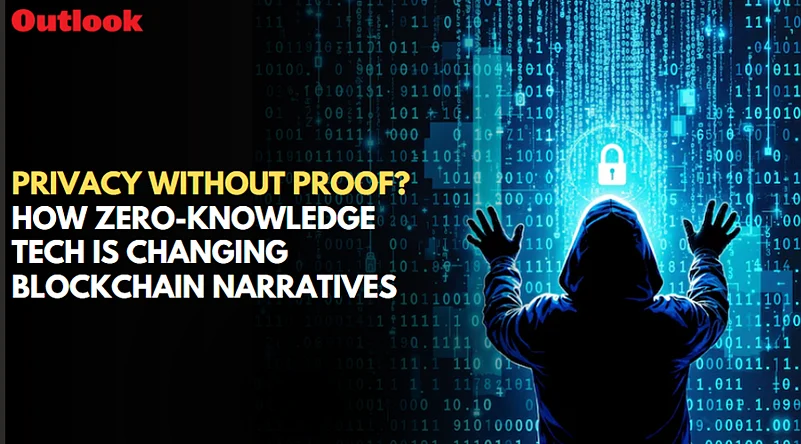Blockchain has become popular over the past ten years due to its capacity to store information securely and transparently. Although transparency is perhaps blockchain's greatest strength, sometimes it poses a problem of privacy. All transactions on public blockchains such as Bitcoin or Ethereum are accessible to anyone, making personal information and financial activity open to monitoring. In an era when privacy is gaining value, a new cryptographic concept known as "zero-knowledge proof" is rewriting the history of blockchain.
What Are Zero-Knowledge Proofs?
Suppose you wish to demonstrate to somebody that you have a secret password, but without revealing what the password is. That is what zero-knowledge proofs (ZKPs) are all about. It's a form of cryptography where someone (the prover) is able to show somebody else (the verifier) that they do possess something, without showing them anything else except that they know it.
ZKPs are not new. They were initially documented by scientists in the 1980s, but they only gained traction in recent years with the development of computer science and increasing demand for online anonymity.
Why Does Blockchain Need Zero-Knowledge Proofs?
Blockchains have also been referred to as "public ledgers" in which anyone is able to check the transactions. Transparency helps to establish trust in decentralized systems. However, it also implies that users enjoy little or no privacy.
Let's consider a simple example. If you pay someone with cryptocurrency, the transaction바카라Ēcombined with the amount, sender and receiver addresses바카라Ēis made public on the blockchain. Eventually, using these addresses to track, an individual can start to determine who you are and how you're spending your money.
Zero-knowledge proofs provide an answer. With this technology, one can verify that a transaction is valid without exposing all the information. Blockchain can therefore continue to be secure and open, but with much improved user privacy.
Applications of ZKPs in Crypto in Real Life
Zcash: Zcash is one of the first and most popular applications of zero-knowledge technology. It is a cryptocurrency that provides the option to make transparent or shielded transactions. With shielded transactions, Zcash employs a type of zero-knowledge proof known as zk-SNARKs, enabling users to confirm their transaction is valid without divulging the sender, recipient, or amount.
zkRollups on Ethereum: Ethereum has been testing a form of ZKPs known as zkRollups. They are employed in order to decrease the amount of data on the blockchain and preserve the capacity to validate transactions. It assists Ethereum's scaling to support quicker and cheaper transactions while also providing privacy advantages.
Identity Verification: ZKPs are also being investigated for digital identity. For instance, you can verify you are over 18 without sharing your precise date of birth. This may revolutionize how we deal with age verification, access to limited services, or even voting systems in the future.
The Shift in Blockchain Narratives
Blockchain was initially lauded for its transparency, but with growing adoption, privacy is gaining equal importance. This change is evident in the way emerging blockchain platforms are being developed. The developers now seek means of creating systems that are both transparent and private. ZKPs are assisting them in finding this balance.
With ZKPs, blockchain technology is shifting from an "everyone sees everything" model towards one of "everyone can verify, but no one can spy." This shift paves the way for wider adoption, particularly among users and enterprises that value privacy without necessarily wanting to abandon decentralized technologies.
Challenges and Limitations
Zero-knowledge proofs are strong but not without difficulties. A major one is the technology's complexity. Deploying ZKPs needs advanced cryptographic expertise and computing resources. Formerly, ZKPs were time-consuming and resource-intensive, but more recent releases such as zk-SNARKs and zk-STARKs have optimized performance.
Another difficulty is regulation. Because ZKPs offer good privacy, there are fears that governments have about their use in criminal purposes. This creates serious debate over balancing transparency and law enforcement with privacy.
The Road Ahead
Zero-knowledge proofs are not yet mature, but they are a significant advance in the realm of digital privacy. As developers, researchers, and businesses pour more capital into this technology, we can anticipate ZKPs playing a starring role in how blockchains are designed going forward.
Where HTTPS brought the internet to safety for banking and shopping, ZKPs might do the same for blockchain바카라Ēsecure, private, and ready for use in our daily lives.
Conclusion
Zero-knowledge proofs are changing our thinking about trust, privacy, and verification in the digital age. Rather than being transparent to all, we are heading toward a future where you can demonstrate something without revealing it. In blockchain terms, that may be the solution to having truly secure and private transactions바카라Ēwhile maintaining the integrity of the system.
While blockchain technology continues to evolve, zero-knowledge proofs could be the key that unlocks its use from that of the select few to one that is trusted by many.














